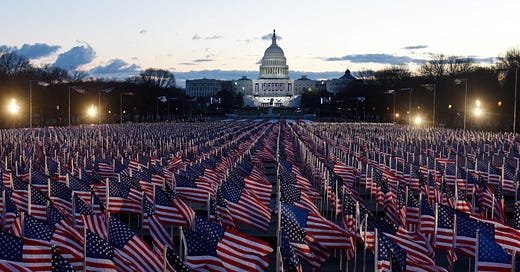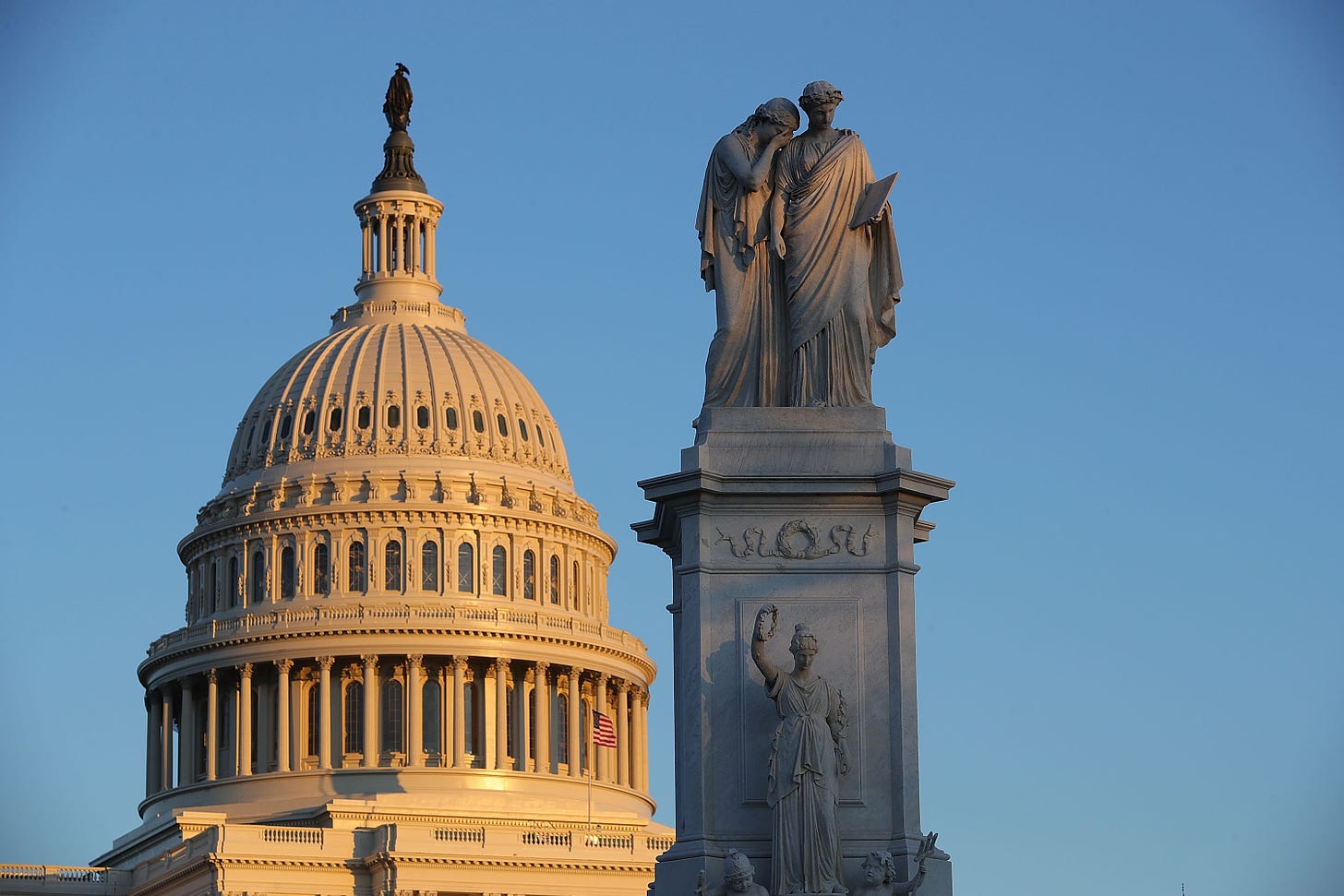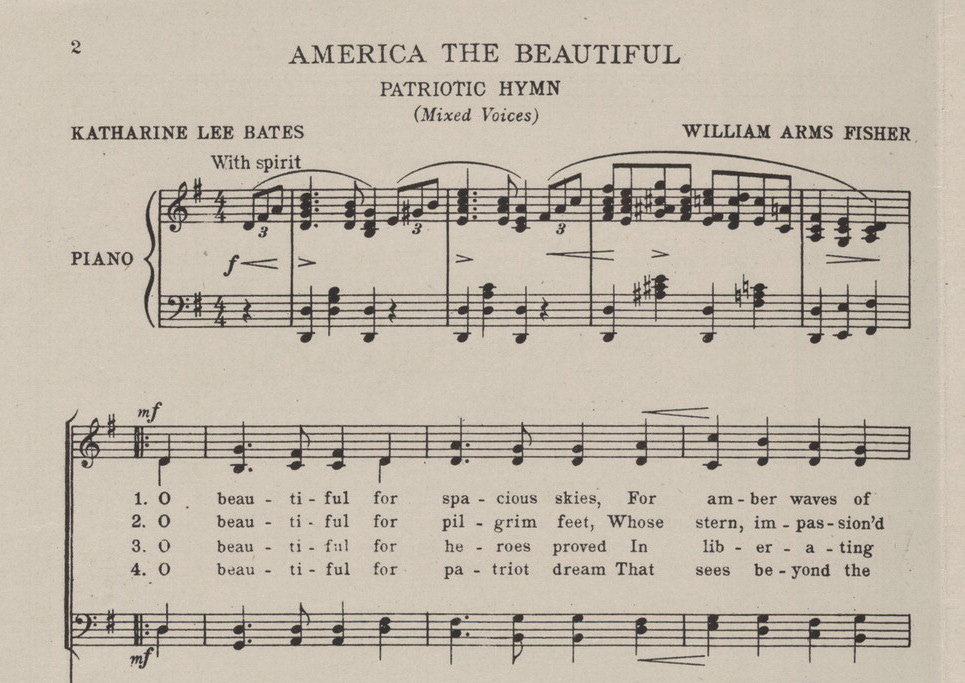January 24, 2021
“Thine alabaster cities gleam
Undimmed by human tears!”
These two lines from the beloved national hymn “America the Beautiful” are to be found way down in the fourth stanza, far beyond what is usually performed, let alone memorized. And yet they have resonated with me at moments of national crisis. I found myself thinking of them again as I saw our great, marbled Capitol, itself often appearing as gleaming alabaster on a bright sunny day, engulfed with waves of insurrection and chaos, then later order and hope.
“America the Beautiful” is a musical tribute to a nation that begins with stirring imagery of natural splendor (purple mountain majesties, amber waves of grain) and includes evocations of the will of a people (“O beautiful for heroes proved / in liberating strife / who more than self their country loved / and mercy more than life!”). But here, with the alabaster cities, is a different idea, that what we build matters, along with our emotional response to those constructions.
A quick search into the history of the song will inform you that it was written by Katharine Lee Bates, an English literature professor at the women’s college of Wellesley (and no relation to the wonderful actor of similar name, as far as I can tell). Bates was inspired by a train ride she took at the end of the 19th century across much of the continent. The “alabaster cities” are a particular reference to the Chicago Columbian Exposition of 1893 which was meant to herald a future of unending promise (shortly before two world wars). By making “cities” plural, Bates undoubtedly meant to generalize the concept of our shining metropolises well beyond any sole example.
This imagery of a shining city, a place of example and hope, has a long tradition in America’s mythic self-identity. The phrase is usually that of a “city upon a hill,” harkening back to a famous treatise of the Puritan preacher John Winthrop where he claimed to his flock of pioneers, "as a city upon a hill, the eyes of all people are upon us" (which in itself is an invocation of the Sermon on the Mount). This notion that what happens in this nation is special, that America is somehow a God-chosen symbol for the rest of the world, has been echoed many times in the centuries since. The “city upon a hill” metaphor was a favorite of Ronald Reagan, but also used by, among many others, John F. Kennedy, Barack Obama, and Ted Cruz, in different conceptualizations as you can well imagine.
Perhaps most intriguing for our current moment, Utah Senator Mitt Romney summoned up this imagery in 2016 in a condemnation of then-presidential candidate Donald Trump: “He has neither the temperament nor the judgment to be president, and his personal qualities would mean that America would cease to be a shining city on a hill.”
I am not sure why I felt compelled to start this first post of my new endeavor with a history lesson, other than to provide context for where my mind finds itself in the present. I have been sitting isolated at home, penned in by a horrific pandemic, and watching a deadly drama about the very soul of our democracy play out in the Federal City I once called home. It has pained me to the core of my being, sparking cascading questions that have pounded in my chest and mind like out-of-control bumper cars in a county fair of the absurd.
Who are we?
Where are we going?
Can we survive?
Will the better angels win?
How can we fix what is newly broken?
How can we confront what was always broken?
Since before its inception, America has been a clash between aspiration and reality, despair and hope. Our great gleaming Capitol, itself sitting upon a hill, is indeed a potent symbol for this nation’s promise of democracy. It is true that Abraham Lincoln was determined to keep the construction of the dome going during the Civil War and said in a quote we have heard many times over the last few weeks, “If people see the Capitol going on, it is a sign we intend the Union shall go on.” But that radiant Capitol has also been the stage for the worst of human impulses. Very flawed men have used passionate oration not to promote our most noble values but to pass cruel legislation that enslaved, imprisoned, disinherited, cheated, and subjugated Black and Brown people. It is true that we have had orderly transfers of power, but many of the men who assumed our highest offices (and they had all been men until now) have used their power in ways that harmed rather than helped. And often those hurt were the most marginalized - racial, ethnic, and religious minorities, women, immigrants, members of the LGBTQ+ community, and others. It is true that Dr. King let his dream ring out across the same precious real estate of the National Mall, but it was a dream born from generations of death and suffering and a dream that remains very much unfulfilled nearly sixty years later.
Now America in its recent years has become the very opposite of a symbol of hope. Under a treacherous, incompetent, and divisive regime we have destabilized the world order, more than promoted it. Donald Trump and his cronies sucked up to murderous dictators and chastised our allies. The world looked to America and saw chasms rather than community, a nation literally killing itself because it was turning its back on facts, and science, and common decency.
And then, January 6.
I don’t need to paint yet another detailed picture of what happened. The images, sounds, and stories from that day are seared into our national consciousness and will be part of any reckoning with the history of this country. What we saw, heard, and felt, can never be unseen, unheard, or unfelt. Donald Trump long had been pushing us to the brink of ruin as a nation, but on that day we were all forced to stare, quite literally, into the abyss.
I see that others have already denoted the symmetry of the first three Wednesdays of 2021. 1/6 Insurrection. 1/13 Impeachment. 1/20 Inauguration (Shall we call them the I’s of January?). What a journey. It is almost biblical in its sequence from wreckage, to reckoning, to rebirth; from loss, to justice, to hope. And it has left us to ponder anew our relationship to gleaming alabaster cities.
On a radiant day this past week, with the West Front of the U.S. Capitol silhouetted in the sunlight, we saw our democracy restored in the solemn pageantry of inauguration. We saw our nation, in all its wondrous diversity, celebrated.
We were summoned by a powerful rendition of the National Anthem (Thank you Lady Gaga). We sang together with a daughter of Puerto Rican parents to a beautiful medley of national songs (Thank you J. Lo). We cried to Amazing Grace (Thank you Garth Brooks). And we were stirred by a fierce young poet who channeled centuries of pain and dreams in verse (Thank you Amanda Gorman).
And then there was a call for unity in President Biden’s inaugural address.
After the trauma we have gone through, and with all the singular challenges that remain, we can hopefully put to rest the simplistic notion that this nation is somehow providentially blessed among others. It is true we are in many ways a lucky people. We have been a country that has enjoyed freedoms and prosperity that many others do not have. Although this freedom and prosperity has not been equally allocated to all of our citizens. We are also a land of great natural resources, but we must recognize that this splendor was wrested at the point of the sword from Native Peoples and built upon the backs of the enslaved. We can never escape the role of the human actor in our national narrative. And that is especially true today.
Tens of millions of Americans rose up in the last election and said that what we witnessed these past years is not what this nation should be going forward. It was a rebuke, but also one that must contend with the tens of millions who were eager to sign up for four more years of Trump. How do we reach more unity? How can we come together in a way that doesn’t paper over the horror or injustices we have lived through?
For inspiration, I come back once more to “Thine alabaster cities gleam / undimmed by human tears!” I quoted the line in the immediate aftermath of September 11 when I was a guest on David Letterman’s first show after the terrorist attack. I went on to say, “We can never say that song again, that way…” What I meant was that the idea that our cities are undimmed by human tears now felt so hopelessly innocent after the mass death. I noted this while shedding my own.
It is true that the horror of those attacks, like the horrors of January 6, live on with us. They are scars on our national psyche. But scars can heal, even if they are not forgotten. This country has a lot of scars, but also has had a lot of healing. It’s not because we somehow walk blindly with God’s grace upon us. It’s because those who came before us toiled, sometimes to their very death, for progress. It’s because of hard work, of action, of organizing, and voting. We don’t believe, or at least damn well shouldn’t believe, that our presidents are anointed. That’s the talk of monarchies and cults. We elect our leaders. We must know they are flawed, like all of us. But buoyed by communities of conscience, we can forge progress and nurture hope.
The task before us is to once again rebuild America’s special place upon a hill. Not to demand fealty from others but to be a beacon that a multiethnic, multicultural polity is not only possible, but that it can be a source of strength. To make this a reality, we cannot forget the tears we have shed, or the tears of those who came before us. But we also cannot dismiss the joy that comes with hope.
Let that joy and that hope be more than ephemeral. Let it be a catalyst that drives us forward to action, and to change. As we step into a new day, let us look clear-eyed into the future but also within ourselves. After the events of January 6, and all that preceded it, it is evident, more than ever, that we have no excuse but to know who we are and who we have been, for better and for worse. This burden of knowledge is ours to bear. As we seek that elusive, shining hilltop, may we reckon with the past, engage with the present, and work to make a better future. The process of doing, of action, makes our goals more attainable. So let us stride forward, together, under a banner of hope, but also of justice.
The Capitol can withstand a debasement. It can emerge to serve as a dais for democracy. It can gleam once more, lit not only by the radiance of the sun but by the determination that bubbles forth from within us, bursting into the smiles and songs of empathy, justice, and the dreams we have for a better nation and world. Steady.
—Dan
Thank you for reading our first post in our new venture. If you haven’t already subscribed, please consider doing so.








I woke from a nightmare this morning. It was based on the lack of control over and the intense despair at what was happening in and to my country over the last five years. Which has been horrible enough but it all brought back my childhood - a childhood steeped in white supremacy, hatred, fear and ugliness. I thought I had escaped all that (on a personal level) years ago and forged my own path in life. Then it exploded on a societal level - every single day - over and over, year after year. The hatred, fear, corruption and gaslighting were relentless. While I did what I could to counter it where I could (calling my Congressional reps, writing letters, donations, reaching out...) my efforts felt useless. Nothing changed. It kept getting worse. Worries not only took up my days but invaded my dreams. Even with the inauguration and the positive changes being implemented now it will take a while to peel this sludge of despair off.
The newsletter that just arrived in my inbox was serendipitous, showing up as it did right after that nightmare. It made me feel a sliver of possibility that maybe we can move forward in good ways. Maybe we can face the brutality of our country’s history, accept how it shaped us all and figure out what to do to repair the damage. Maybe we can face the ugliness that permeates our society and begin, together, to root it out and make positive changes that benefit us all and become the new bedrock of our society. It will take time and much effort by many of us but maybe it is possible. **I was getting ready to hit Send when I thought I should clarify the use of the word ‘maybe’. I believe these changes absolutely need to be made. No maybe to them. I say ‘maybe’ because I’ve seen too much of the ugly side of human behavior and I’m not sure we will do what is right and just. I hope so. I just don’t know if humans are truly capable - on a grand scale - of this. I do hope so.
Thank you Mr Rather for such an eloquent, truthful and hopeful essay.
Thank you Mr. Rather. I am both grateful & humbled by your words. To have an opportunity to partake in this reading, to expand my mind on behalf of your perception, is a gift I feel you have given to me & so many others if they so choose to take that walk w/you through what was, what is, and what could be. Again,Thank you.